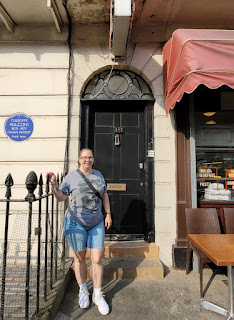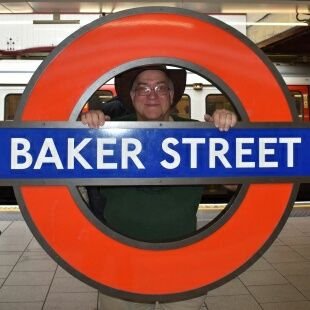Sunday, November 27, 2022
Interesting Interview: Heather Hinson
Sunday, November 13, 2022
Interesting Interview: Phil Bergem
This week, Phil Bergem is out Interesting Interview. And I have to apologize up front. Phil might be one of the most delightful fellas out there, and I should have have interviewed him long before now. In fact, I was looking over the list of past interviewees and really thought I'd forgotten to list Phil because I couldn't imagine that I hadn't talked to him yet! So it's time to put right what once went wrong.
Phil is one of those guys you see at plenty of events, and he just radiates good vibes. I've been lucky enough to write a chapter for his next BSI Press project coming out in January, and he wrote an absolute corker of a piece for The Monstrum Opus of Sherlock Holmes connecting a classic Sherlockian mystery to a very creepy Conan Doyle tale. Phil has also overseen so many publications coming out of Minnesota, that I won't even try to list them because I will definitely miss something. But Phil isn't just a great writer and editor. In his answers below, his good nature shines through and he has that has that "big tent" mentality that welcomes everyone. So enough telling you about how great of a guy he is. Let the great guy speak for himself!
How do you define the word “Sherlockian”?
Anybody who wants to dig a bit deeper than the original stories, the movies or television series. We all come to Holmes in our own manner. The question is what a person does after the introduction. If someone watches Sherlock or reads The Adventures of Sherlock Holmes, says that they enjoyed it, but doesn’t go farther, they’re a fan. That’s all well and good, but I consider a Sherlockian to be a person who wants more. Whether that is reading the Writings on the Writings, learning about life in the Victorian era, producing artwork, or writing fan-fiction, as long as they wish to expand their interest and dig deeper, they’re a Sherlockian.
How did you become a Sherlockian?
When I was young, perhaps 9 or 10 years old, I was given some Sherlock Holmes stories to read. They didn’t take at that time. In the 1980s, when in my late 20s, I watched the Granada/Jeremy Brett series on television. I found them interesting enough that I bought a collection of the stories. I had recorded the episodes and when I compared the dialogue to the stories, I figured out that the best lines had been written by Conan Doyle and freely used in the scripts. This prompted me to go out and find other books by Conan Doyle. Eventually I found out about the local Sherlockian group, the Norwegian Explorers, and got more and more involved with them.
What is your profession and does that affect how you enjoy being a Sherlockian?
I work as a Civil Engineer for the Minnesota Department of Transportation. It does not affect my Sherlockian life, but my Sherlockian life has helped my work. With various writing, editing, and publishing projects, I have become very adept with Word and that helps me with reviewing and writing engineering documents.
What is your favorite canonical story?
“The Empty House.” In it, Watson describes, loosely, their walk from Cavendish Square to the Empty House across from Mrs. Hudson’s lodgings. When I annotated Out of the Abyss for the BSI Manuscript Series, I used maps from the period and came up with my own choice for their route. On a trip to England in 2018 I walked it. This intimate connection with the story adds to the enjoyment of it all.
 |
Bernard Davies’s choice for the location of the “Empty House” in London (middle building). |
Who is a specific Sherlockian that you think others would find interesting?
I hope that you do not mind me mentioning two people. One is Paul Thomas Miller of The Shingle of Southsea in Portsmouth. He has an amazing amount of energy and comes up with interesting projects. He is also the right kind of crazy, which I admire.
The other person is Julie McKuras. She is outgoing and enthusiastic. With her interests, talents, and supportive husband, she has accomplished a lot, had a number of great Sherlockian experiences, and met very many interesting Sherlockians. As a result, she can tell some great stories.
What subset of Sherlockiana really interests you?
I am fascinated by the Beeton’s Christmas Annuals, The Strand Magazine, and Conan Doyle’s family history.
I am fortunate that nearby Sherlock Holmes Collections at the University of Minnesota has four copies of the 1887 Beeton’s Christmas Annual. I was able to examine them closely and to compare conditions. I am also fortunate that I am able to take vacations to interesting places. On various trips I have searched out people and institutions that have one of the 1887 issues. Over the decades of my pursuit, I have seen and examined twenty of the thirty-four known copies.
The Annual was printed from 1860 until 1898. Issues for many years are rarer than for 1887, although of much less interest, and images of most of the covers are not available on the Internet. I have been working to get photographs of the covers and itemize the contents of all the other years. My intent is to someday develop a webpage to share my findings.
 |
| Cover for the 1889 Beeton’s Christmas Annual. |
As a stalwart member of The Norwegian Explorers of Minnesota, why do you think that region of the country has had such a strong contingency of Sherlockians over the years?
The cold, harsh winters.
Seriously though, we lucked out with the four founders of the group. One of them, E. W. McDiarmid, was the University of Minnesota Librarian. Through his involvement, and that of the Special Collections Curator, Austin McLean, they worked to build a significant enough collection of Sherlock Holmes materials that John Bennett Shaw decided to add his collection to it. The ties between the Explorers and the Collections were significant in attracting and retaining members. They, in turn, attracted other interesting people. Enough of the members are good at organizing, and have the right levels of energy, ideas, and enthusiasm, that we have been able to host well-received conferences and produce some good publications, including the popular Norwegian Explorers Christmas Annual. In my opinion, having the Sherlock Holmes Collections at the University of Minnesota has given the Norwegian Explorers a focal point to work with and to care about.
You've been associated with the BSI Manuscript Series for years. What are some fond memories you have of these projects?
I have been lucky to be allowed to transcribe and annotate the various Sherlock Holmes manuscripts for the series. In addition to annotating differences between various printings (first British and US periodical and book editions, and the iconic Doubleday Doran and the John Murray editions) I like to address things that were not covered by Baring-Gould or Klinger in their annotations. There is usually one finding in each book that I particularly love. Examples include finding a music release titled “Ionides of Alexandria” (The Wrong Passage (GOLD)), finding a photo of the 100-HP Benz which is mentioned (Trenches (LAST)), researching “that great forest” and Tudor period iron smelting (Deadly Harpoon (BLAC)) and Watson’s mention of tennis shoes and their use in the late 1880s (The Worst Man in London (CHAS)). It’s fun to explore these tidbits and even more fun to share them.
What book would you recommend to other Sherlockians?
Again, I’d like to offer two. The first is From Holmes to Sherlock by Mattias Boström. It wonderfully outlines the Sherlockian movement from the origins to current day (or when it was published in the US in 2017) and gives a well-written and lovingly researched account of the history of Sherlockiana and how the present interest in Sherlock Holmes came to be.
The second book is a pastiche that I enjoyed — Holmes Volume 1: Enigma, Detective, Boro Lad by Melvyn Small (recently re-released as The Accidental Detective). It is set in present times in northeastern England, the area where I lived during my high school years. This Holmes is a cross between Jonny Lee Miller and Benedict Cumberbatch, speaking with the curse-filled lingo of a Middlesbrough lad. While I was attracted by the setting, I enjoyed the stories and relationship between Watson and Holmes. I think it deserves some additional exposure. There are three books in the series, the other two being The Song of the Swan and Three Pint Problems.
Where do you see Sherlockiana in 5 or 10 years from now?
I think that with our collective experiences of meeting virtually over the past three years, that method will continue even as we start meeting in person again. A result, I expect, will be more and more intermingling of Sherlockians across the US and between nations. I hope that there is a continuing influx of people attracted by Enola Holmes, the upcoming Robert Downey, Jr. movie, and the steady stream of new pastiches being printed. We need younger members and more diversity among the membership.
Holmes and Watson are a convenient, established way of telling interesting stories with an always-popular underlying message of friendship. I believe that there will continue to be a strong interest in Sherlockiana as new material is written and people find their way back to the original stories.
Sunday, November 6, 2022
The Disposition of the Child [COPP]
Reading "The Copper Beeches" on this Fall weekend made certain things stick out. Every mention of the titular trees made me look around to appreciate how vibrant the leaves are in my neighborhood. And Halloween being right around the corner made me think of werewolves every time Carlo was mentioned (If you're unfamiliar with that argument, I strongly recommend checking out Ray Betzner's essay "Whatever Happened to Baby Rucastle" in The Monstrum Opus of Sherlock Holmes.)
But more importantly to this teacher's mind was another autumnal constant: Parent/Teacher Conferences.
Now, what do Parent/Teacher Conferences have to do with "The Copper Beeches" you might ask? Let me quote Sherlock Holmes to explain that for you:"My dear Watson, you as a medical man are continually gaining light as to the tendencies of a child by the study of the parents. Don't you see that the converse is equally valid. I have frequently gained my first real insight into the character of parents by studying their children. This child's disposition is abnormally cruel, merely for cruelty's sake, and whether he derives this from his smiling father, as I should suspect, or from his mother, it bodes evil for the poor girl who is in their power."
Let me be clear, I'm not claiming that I have students who spend their lives alternating "between savage fits of passion and gloomy intervals of sulking" or that giving pains to any creatures weaker than themselves seems to be an idea of amusement.
But Holmes's diagnoses of the apple not falling too far from the tree would ring true to any teacher. The talkative kids in class? Those are the conferences that I worry will run overtime with the parents. The kids who want to please and are wonderfully behaved? Those conferences will be with some delightful folks. The intellectually curious kids will likely be repped by folks who have great questions of their own when we talk. I could go on and on....
Other children in the Canon prove Holmes's point as well. Jack Smith, the pilot Mordecai Smith's young son comes to mind. He shows an entrepreneurial spirit in The Sign of Four, just like his father who is not opposed to working with some shady folks for the right price.
Early on in "The Copper Beeches," Jephro Rucastle describes his son as "a child who may some day play a considerable part in the history of the country" and a few paragraphs later laughed at how vicious Edward was toward cockroaches. Do we see parallels in the father's own nature? The way he speaks to Violet Hunter once she is in his employ, the way he treats his daughter, and how he speaks to Holmes at their meeting shows that the man feels that he is on a higher plane that some folks. And it's very clear that Rucastle has a violent streak in him just like his boy.
Growing up, was Jephro Rucastle an "utterly spoiled and so ill-natured a little creature" as his own son is? If Sherlock Holmes and Parent/Teacher Conference data have anything to say, it's pretty safe to say that both Rucastles follow similar paths. But the traumatic closing events of "The Copper Beeches" may not have saved only Violet Hunter and Alice Rucastle. That fateful night may have altered the trajectory of Edward Rucastle's life as well and kept him from turning into his father. And for that, the mice, birds, and little insects of Hampshire should be glad.









